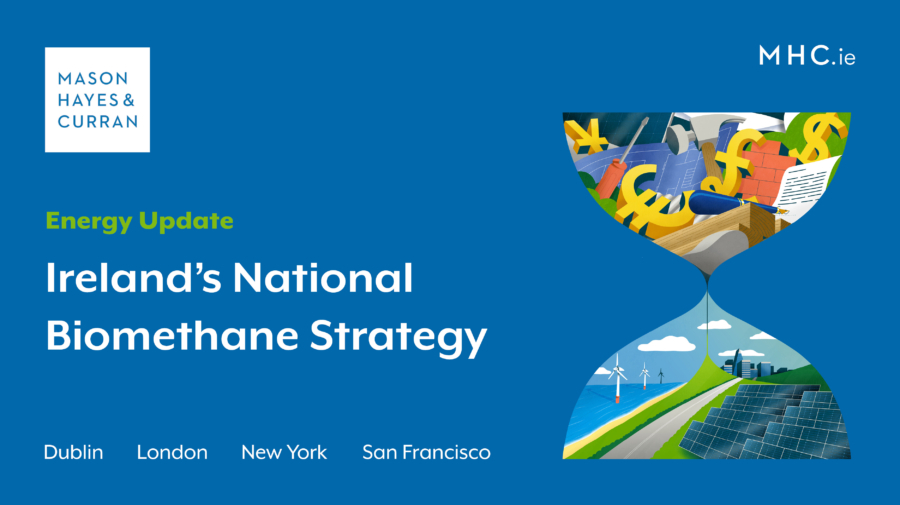Ireland’s National Biomethane Strategy

The Government has announced the publication of Ireland’s National Biomethane Strategy. Its publication is intended to demonstrate the Government’s commitment to the delivery of up to 5.7TWh of domestically produced biomethane by 2030. Our Energy team discusses the strategy.
The National Biomethane Strategy was published by the Department of Environment Climate and Communication (DECC) and the Department of Agriculture, Food and Marine (DAFM) and provides the framework to assist Ireland with the development and implementation of a biomethane industry in Ireland.
The Strategy is the first step in the Government’s commitment to creating an Irish biomethane industry. It sets out 25 key action items to swiftly mobilise the industry. As it stands, Ireland only has two operational biomethane facilities connected to the gas grid. This equates to only 0.001% (75GWh) of Ireland’s annual gas demand and the Strategy seeks to increase this to 10% by 2030.
To achieve this, the Strategy notes that an additional 140-250 Anaerobic Digestion (AD) facilities, with an average output of 40GWh, will be needed.
Government assistance
The Strategy has identified two methods to stimulate growth of the biomethane industry to achieve this target. Capital Grants, and the introduction of the Renewable Heat Obligation (the RHO). The Strategy outlines that these methods offer budget certainty while also being capable of delivering a sector of scale.
Capital Grant Supports
AD facilities are capital intensive projects. Capital Grants worth €40 million have been made available to assist with the development of biomethane facilities in Ireland. This funding will be subject to the review of the European Commission and Council as it was secured under the REPower EU scheme.
It’s anticipated that further grants will also be made available as a finance scheme is being explored for smaller facilities and is expected to be completed in Q4 2024.
RHO
To support the decarbonisation of the heat sector, the Government has sought to implement the RHO by the end of 2024. The RHO will obligate suppliers of fossil fuels (used for heating) to ensure that a portion of their products are being supplied by renewable sources thus stimulating demand for certified biomethane.
Enabling policy requirements
The Strategy has said that in order to facilitate the delivery of its goals and ambitions, the following policy actions will be needed to assist with the industry’s development:
Action |
Owner |
Expected Delivery Date |
The establishment of the Biomethane Implementation Group to deliver a Strategy Implementation Plan |
DECC |
Complete |
Engage with Gas Networks Ireland and the Commission for the Regulation of Utilities to finalise the biomethane grid connection policy |
DECC |
Q3 2024 |
Develop a communications strategy to engage with stakeholders |
DECC |
Q3 2024 |
Develop an online Information Hub to provide AD project development assistance including information on technical, environmental, and financial advisory supports available |
DECC/DAFM |
Q3 2024 |
Carry out a skills gap assessment to build capacity and skills required for an indigenous biomethane sector |
Biomethane Implementation Group |
Q3 2024 |
Review resourcing requirements of key government agencies to support development of the biomethane industry including EPA licencing, ABP licencing and Planning |
Biomethane Implementation Group |
Q3 2024 |
Develop guidelines to support local authorities when assessing AD and biorefinery planning applications |
Biomethane Implementation Group |
Q4 2024 |
Assess how best to advise feedstock suppliers on best practices around sustainably produced AD feedstock supply whilst ensuring best environmental practices |
DAFM |
Q4 2024 |
Establish governance structure to support strategy delivery including identification of appropriate KPIs, and target monitoring and reporting process |
DECC |
Q4 2024 |
Comment
The Strategy contends that Ireland, per capita, has one of the highest potential capacities for biomethane production in Europe. As part of the process of decarbonisation for the ultimate goal of reaching our Climate Action targets for 2030, it is important that alternative renewable fuel sources be identified. It is noted in the Strategy that unless Ireland commits to a biomethane programme, we are unlikely to meet our 2030 Climate Action targets.
Biomethane as an indigenous fuel source presents an opportunity to bolster Ireland’s agricultural sector and strengthens the country’s energy security. The Strategy is the first step in growing such an industry. However, the Strategy itself acknowledges that many critical actions must first be taken before we can expect to achieve any of its ambitious targets.
For more information, contact a member of our Energy team.
The content of this article is provided for information purposes only and does not constitute legal or other advice.
Share this:


